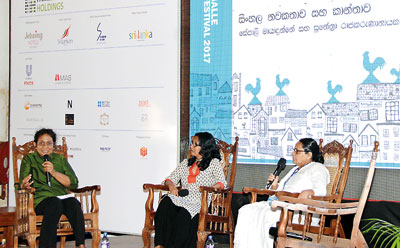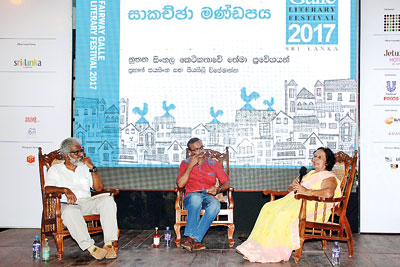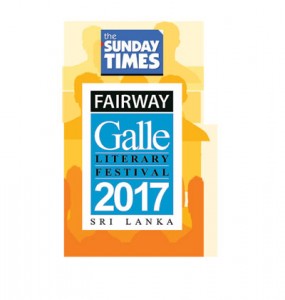Themes, styles and translations come under microscope

The sessions on ‘The Woman’s Novel in Sinhala’ (above) and ‘Thematic approaches in contemporary Sinhala short stories’ (below)
“We live amidst a problematic society. These problems range from globalisation, to racism, to politics etc. To me personally the best way to portray these issues is through short stories,” Professor Piyaseeli Wijemanna told her audience at the Galle Maritime Museum.
The first ever Sinhala Day organised by the Fairway Galle Literary Festival took place on Saturday, January 14 at the Maritime Museum and Law Court Square, Galle Fort. Prof. Wijemanna was one of the panelists along with other well-known names in the Sinhala literary scene.
With over 50 academic papers to her name, ten children’s stories, three novels and two translations, Professor Wijemanna is a renowned creative writer. She has, on three occasions won the State Literary Award for her short stories.
During her session on ‘Thematic approaches in contemporary Sinhala short stories’ she explained that short stories have inspired her, ever since her school days. She adds that writing novels gives her a lot of freedom as opposed to a short story, but maintains that she cannot stop writing a novel, once she begins.
She was joined on stage by Prabath Jayasinghe whose work includes poetry and fiction. His published work includes three collections of short stories and a narrative poem.
‘Anawaratha’, his narrative poem, written in 2008, went on to receive nominations for two national awards. In 2010 his first book of short stories ‘Vayambadiga Vasiyekuge Dina Satahan’, bagged the ‘Vidyodaya literary award’. His second collection, ‘Deva-Kanya’, was nominated for two awards. His latest publication ‘MakaraThorana’ was released in 2016.
“I wasn’t always confident with my writing,” he told the audience, adding that after his first book, his confidence increased.
Despite the literary heavyweights present at that session, the hall remained half full, which was probably due to people not knowing about the event, as Uthpala Ganewita, one of the programme’s organisers, commented. Next time they hoped to have a bigger promotion for the event.
However the previous sessions, did see several enthusiasts amongst the audience. And the hall filled up for the next session, which was conducted by Shehan Karunathileke and Dileepa Abeysekera, on translating Karunathileke’s internationally acclaimed book ‘Chinaman’.
The decision to dedicate a day for sessions on Sinhala Literature had come about following suggestions received by the organising committee. According to Uthpala, some of the Universities in the country had also made such requests, since there were several students who had wanted to attend the sessions.
The morning sessions had included a thought provoking discussion by the creative younger generation poets, Malathie Kalapana Ambrose, Isuru Chamara and Sunanda Karunaratna on ‘Poetry of the next Generation’. The panel explored several themes and styles of modern Sinhala poetry. Their session was followed by a conversation conducted by Sepali Mayadunne and Sunethra Rajakarunanayake on ‘The Woman’s Novel in Sinhala’.
The day’s proceedings came to a close following the interesting discussion on the translation of ‘Chinaman’.

J.S.


